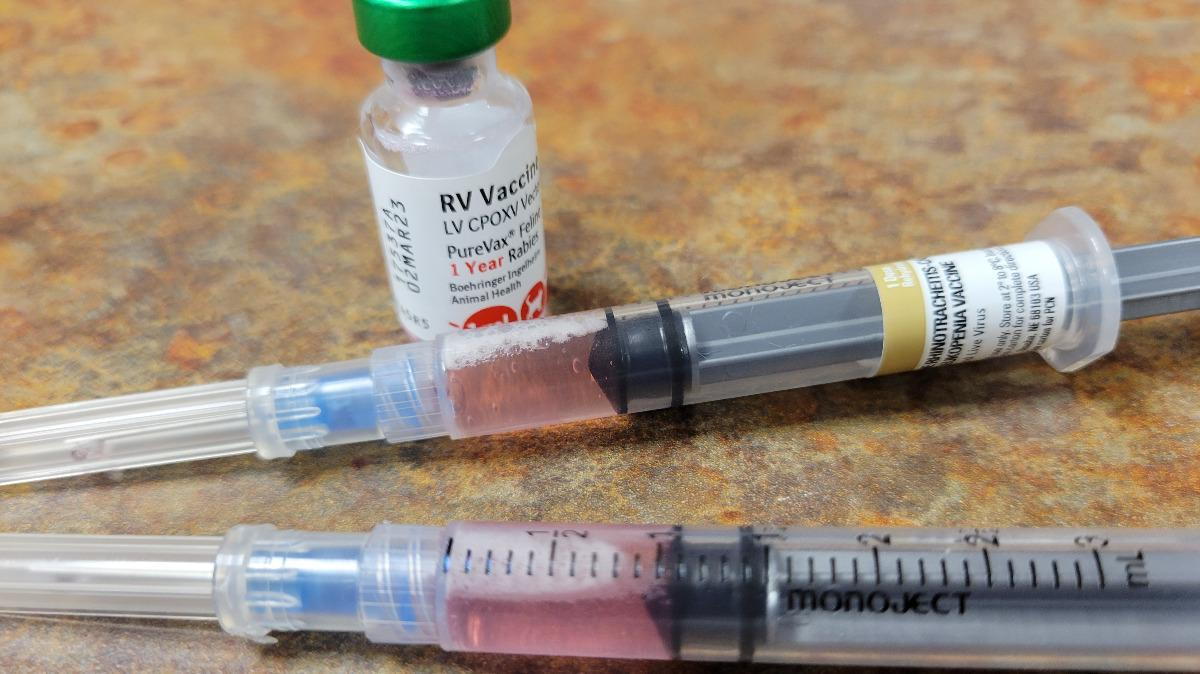Why Vaccinate My Pet?

- posted: Aug. 12, 2023
Why Vaccinate My Pet?
Vaccines are an important part of keeping pets healthy and in preventing many diseases that may not only make our pets sick but also against some illnesses that can affect humans. Core vaccines are important, but many other vaccines are given based on risk or lifestyle. Let’s learn more about common vaccines and when you should vaccinate.
Rabies—this is a core vaccine and required by law in Pennsylvania for all dogs and cats regardless of risk and regardless of whether or not your pet goes outside. Rabies is a serious human health risk and is considered to be 100% fatal if contracted. Rabies is spread by contact with saliva of an infected animal. Bats, raccoons, skunks and foxes are common carriers. There is no test for rabies that can be done on a live animal. Remember, bats occasionally make their way into homes too, so indoor-only pets are not without risk. Rabies vaccination is vital to preventing this deadly disease.
Distemper/parvovirus for dogs and calicivirus/herpes/panleukopenia vaccines for cats—these vaccines are also considered to be core vaccines for all dogs and cats by the AVMA, AAHA, AAFP and other veterinary institutes and governing bodies. These are serious illnesses, some of which can be fatal. Prevention of spread of these viruses throughout pet populations is key to protecting our pets against disease, and routine vaccination is essential. Multiple boosters are usually given to pets with no prior vaccine history and proper timing of boosters is necessary to ensure that protective immunity develops.
Leptospirosis—usually included with distemper/parvo vaccines for dogs (cats are not susceptible to leptospirosis) this bacterial infection can be found in both urban and rural areas. Urine from animals such as rats, squirrels, skunks, raccoons and other wildlife can contain the bacteria and can contaminate ponds and other standing water, including tubs or buckets and other vessels in our backyards. Hunting and farm dogs are at higher risk, but almost all dogs should receive this vaccine annually. Leptospirosis causes liver and kidney damage and can be fatal. It is also zoonotic, meaning people may also become infected and the bacteria can be passed from dog to human.
Lyme—Lyme disease is very common in Pennsylvania, especially in York County and the veterinarians at Patton Veterinary Hospital believe almost all dogs should be vaccinated. Ticks are more prevalent in wooded areas so dogs who hunt or who go camping with their owners or live on wooded lots are high risk. However, ticks can also be found in suburban yards and parks. Vaccination in combination with a good flea and tick preventative can drastically reduce the chance of your dog becoming infected with Lyme disease. Cats are rarely affected and there is currently no Lyme vaccine available for cats.
Bordetella/Canine Flu—these vaccines (dogs only-limited risk to cats) are important for dogs who interact with or are exposed to a lot of other dogs at places such as dog parks, boarding kennels, grooming facilities, doggie daycares, dog shows, etc. If your pup is pretty solitary, he or she may not need these vaccines, but if he is exposed to other dogs, make sure to keep him protected.
Feline Leukemia—this vaccine is recommended for all kittens and for any cats who spend time outdoors. Outdoor cats are at particularly high risk for feline leukemia virus, especially if in contact with unknown/stray cats who may be carriers and should be vaccinated yearly. If your adult cat is solely indoors or only goes out under direct supervision, she may not need a feline leukemia vaccine.
Ferrets should also be vaccinated once a year (after an initial series) against rabies and canine distemper to which they are susceptible. Other pocket pets such as rabbits, guinea pigs and rats do not require vaccinations.
All pets should receive core vaccines every one to three years unless there is a serious medical contraindication or previous vaccine reaction. Leptospirosis and Lyme are also important vaccines for dogs in our area and outdoor cats should be protected against feline leukemia virus which can be fatal if contracted. Have a conversation with our vets and staff about your pets’ lifestyles and risks to be sure that they are being properly protected and to keep them healthy.
This blog brought to you by the Patton Veterinary Hospital serving Red Lion, York and the surrounding communities.
https://www.avma.org/resources-tools/pet-owners/petcare/vaccinations
Location
Patton Veterinary Hospital
425 E Broadway
Red Lion, PA 17356
